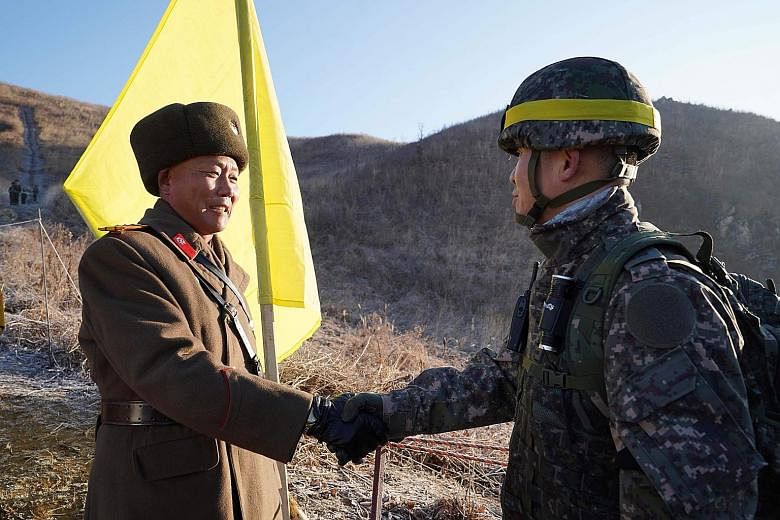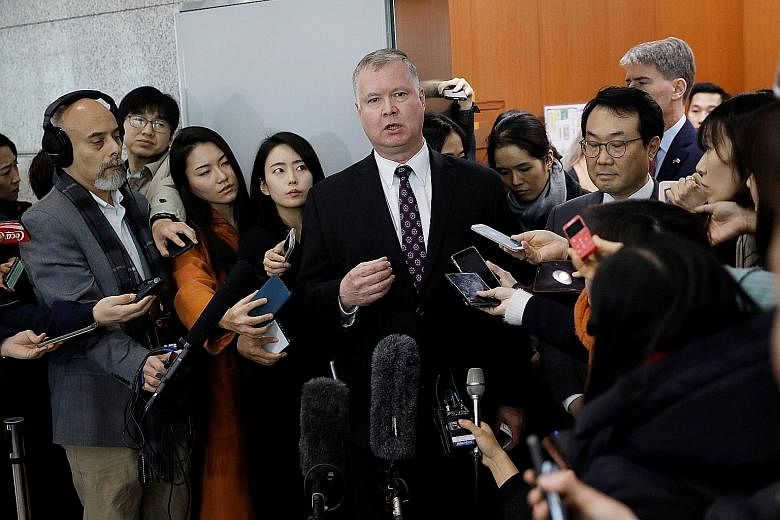United States President Donald Trump is ready to end the Korean War, said special envoy Stephen Biegun on Thursday, in a signal that a formal end to the decades-long conflict could be on the cards, ahead of a second summit between Mr Trump and North Korean leader Kim Jong Un planned for this month.
Mr Biegun also revealed that Mr Kim committed to dismantle and destroy North Korea's plutonium and uranium enrichment facilities when Secretary of State Mike Pompeo visited Pyongyang last October.
The complex of sites represented the "totality" of North Korea's plutonium reprocessing and uranium enrichment programmes and went beyond the now-inactive Yongbyon nuclear facility, which Mr Kim already pledged to give up if the US would take corresponding actions, he said.
A declaration to end the Korean War has been a long-held wish of both North and South Korea, but the US has thus far been reluctant to agree to even a symbolic statement over concerns it could lead to calls for the withdrawal of the 28,500 US troops stationed in South Korea.
"I am absolutely convinced, and more importantly, the President of the United States is convinced, that it's time to move past 70 years of war and hostility on the Korean peninsula. There is no reason for this conflict to persist any longer," said Mr Biegun in his first public speech since being appointed the Trump administration's point man on North Korea in August last year.
"It is over. It is done. We are not going to invade North Korea. We are not seeking to topple the North Korean regime," he said at Stanford University.
Mr Trump said on Thursday that his second summit with Mr Kim, scheduled for the end of this month, was "moving along well" and that he would announce more details next week, likely during his State of the Union address on Tuesday.
Mr Pompeo said on Wednesday that North Korea had agreed the summit would be held "some place in Asia".
Mr Biegun himself will travel to Seoul tomorrow to meet his South Korean counterpart Lee Dohoon.
He will also have follow-up meetings with his North Korean counterpart Kim Hyok Chol to discuss the next steps to advance America's objective of the final fully verified denuclearisation of North Korea, and to make further progress on all the commitments the two leaders made at the Singapore Summit in June last year, the State Department said in a statement on Thursday.
Progress on denuclearisation has somewhat stalled since the summit in Singapore. Pyongyang has said Washington should reciprocate its good faith in dismantling the Punggye-ri nuclear test site and ending nuclear missile tests by lifting punishing sanctions. Washington's stance has been that sanctions will not be lifted before Pyongyang achieves complete, verifiable, irreversible denuclearisation.
-
NORTH KOREA
-
WHAT IT PROMISES
• At the Singapore Summit last year, North Korean leader Kim Jong Un committed to the complete denuclearisation of the Korean peninsula.
• North Korea pointed to unilateral moves such as the destruction of its Punggye-ri nuclear test site, among other actions, as signs that it was following through on its commitment.
• Pyongyang also agreed, at the third inter-Korea summit in September last year, to dismantle its Yongbyon nuclear facility in the presence of American and International Atomic Energy Agency inspectors, on the condition that the United States take "corresponding actions".
-
WHAT IT WANTS
• North Korea wants the US to ease sanctions and guarantee the security of its regime, as well as make a formal declaration to end the Korean War.
• Of late, it has complained that the US has been too demanding in calling for unilateral denuclearisation. Instead, Pyongyang prefers reciprocal, step-by-step concessions and has called on the US to build confidence and mutual trust.
Mr Biegun's contention that Pyongyang had promised to get rid of its plutonium and uranium enrichment programme was greeted with some scepticism in the light of the US intelligence community's annual assessment on worldwide threats, released earlier this week, that North Korea was unlikely to give up all of its weapons of mass destruction stockpiles, delivery systems, and production capabilities.
When questioned by former diplomat and seasoned Korea scholar Ben Carlin, who took part in US-North Korea negotiations from 1992 to 2000, Mr Biegun did not contradict the intelligence assessment but said it was "divorced from policy".
"North Korea has given us little indication that they have yet made the decision to completely dismantle and destroy that capability. We all know that," said Mr Biegun.
"Therefore, 'what' is the question, and what President Trump has done is directed the Secretary of State to engage diplomatically through a combination of pressure and incentives to see if we can invite North Korea to make a different set of choices. That's the complete picture," he added.
In his speech, Mr Biegun tried to appeal to impoverished North Korea with promises of economic prosperity as he sought to show a way out of the diplomatic impasse.
"At the appropriate time, with the completion of denuclearisation, we are prepared to explore with North Korea and many other countries the best way to mobilise investment, improve infrastructure, enhance food security, and drive a level of economic engagement that will allow the North Korean people to fully share in the rich future of their Asian neighbours," he said.
-
US
-
WHAT IT PROMISES
• United States President Donald Trump has committed to give security guarantees to North Korea at his summit with Mr Kim Jong Un last June.
• The US also promised that should North Korea carry out its commitment to complete denuclearisation, the US will work with it to boost its impoverished economy, attract investment, improve infrastructure and enhance food security. Central to this would be the lifting of current sanctions on North Korea.
-
WHAT IT WANTS
• Top of the US' list of demands is North Korea's complete, verifiable and irreversible denuclearisation. This means completely eliminating its nuclear weapons programmes, including the means of production and delivery of intercontinental ballistic missiles.
• The US wants a complete list of nuclear weapons and missile sites from North Korea, though not necessarily right away, officials have indicated.
• Mr Trump and Mr Kim also agreed to repatriate the remains of troops killed in the Korean War. Those of 55 soldiers have since been returned.
But while the future was "bigger than denuclearisation", final, fully verified denuclearisation remained the foundation of US policy to North Korea, Mr Biegun stressed.
He signalled that the US could be willing to step back from earlier demands that denuclearisation had to come before all else, saying: "If we do not address the weapons of mass destruction issue on the Korean peninsula today, we will have an Asia-Pacific nuclear weapons challenge tomorrow… But in relative terms, we're also not demanding that this be the starting point.
"In parallel, we're willing to look at a lot of other things that we can do together that also build the confidence and reduce the sense of risk or threat that would potentially drive a country to want to sustain that kind of capacity."
Mr Biegun also said that before the process of denuclearisation could be final, the US must have a complete understanding of the full extent of the North Korean nuclear missile programmes, but hinted this did not need to come right away.
"We will get that at some point through a comprehensive declaration," he said.
Former State Department official Mintaro Oba told The Straits Times: "It's certainly a step forward for a US official to directly state that the United States won't invade North Korea, and that it wants to end the Korean War. I can't recall any previous instance where that has happened."
Public comments like these help send the right signals to the North Koreans that the United States is serious about the diplomatic process, added Mr Oba, who worked on North Korea policy.
But Mr Biegun's comments about a comprehensive nuclear and missile declaration suggest little has changed substantively in America's position, he said.
"If Washington's main goal is denuclearisation, it will have to be much more flexible to make any progress with North Korea, which highly values its nuclear programme and is unlikely to document and reveal everything it has, especially without major US concessions," he said.
These concessions could include the lifting of sanctions, which would have to be a part of any ambitious and comprehensive deal with North Korea, and security guarantees and progress towards the normalisation of relations, he added.


